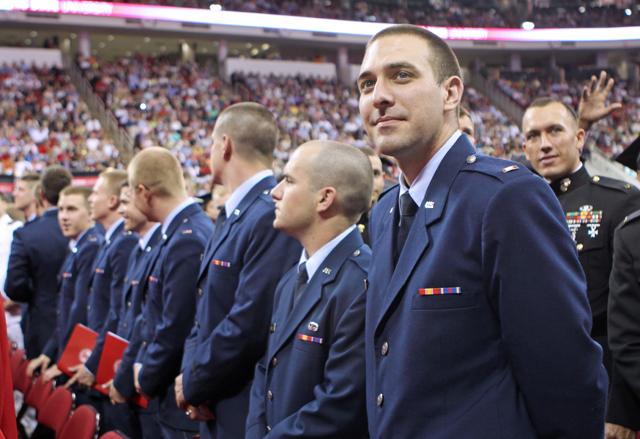
© 2011 NCSU Student Media
Justin White, a graduating senior in history, looks into the crowd at the RBC Center before commencement. White said he will definitely remember his commissioning ceremony held the night before and looks forward to serving in the Air Force. Photo by Patrick Easters
Unlike 3,394 of his undergraduate colleagues who turned their tassels this May, Brooks Robinson knows exactly where he’ll be within a year.
The recently commissioned second lieutenant in the Army will be in Afghanistan, while his former classmates will still be searching for a job.
The end of college brings forth a world of uncertainty to many graduates looking for jobs, but 34 graduates from the ROTC programs have a certain course to follow after leaving N.C. State. This future, however, presents uncertainty to young officers making the transition from students to soldiers.
Army Second Lieutenant Brooks Robinson, a recent graduate, will soon start active duty service. Although Robinson was not willing to comment on his feelings about deployment, he said he sees it as an opportunity to serve his country, however uncertain that opportunity may be.
“I have a military intelligence assignment at Fort Huachuca, in Arizona,” Brooks said. “The assignment is a little unclear, but they will brief and train me along the way.”
Lieutenant Colonel Chris Froeschner, commander of an Air Force ROTC detachment, said a commission in the military represents more than moving on to a new job.
“The commission is important because it is a step towards a new life of service,” Froeschner said. “It’s a graduation in a totally different sense; it’s an edict issued to the new officers by the president.”
The commissioning ceremonies for the four branches took place the day before graduation on May 13. According to Froeschner, the ceremonies had separate oaths, but they all share the same principle.
“They have their respective nuances, but they all include the pledge to support and defend the Constitution of the United States against all enemies, foreign and domestic,” Froeschner said. “It’s officially giving them the power as a leader and officer to serve.”
The commissioning ceremony represents more than an assignment to active, reserve or National Guard duty. It’s also the culmination of four years of training.
“It was four years of hard work,” said Second Lieutenant Andrew Chambers, former Army ROTC cadet. “It’s a lot more than graduation. It’s better.”
Chambers, who will be going on active duty Nov. 13 and will train at Fort Rucker, Alabama, as a helicopter pilot, said he was glad to look back at everything he has accomplished.
“It’s great to see how all the hours of work and the leadership test got me here,” Chambers said.
According to Froeschner, commissioning is a process four years in the making.
“We look at their involvement in ROTC and affairs at the University as a four-year job application,” Froeschner said. “There are four years of class, leadership labs, physical training, and so forth. As a cadre, we vector them; we teach them how to lead by leading each other.”
Not all newly commissioned officers immediately go active duty, according to Froeschner. For example, Chambers must wait until November before he starts training and receiving his pay.
“I’m living at home right now, but I’m getting ready for the job to come,” Chambers said.
Other newly commissioned officers start active duty service, which is different from deployment, within a week of commissioning.
“I takes a few months to a year before many people actually get deployed to a theater,” Brooks said.
Not all students eventually go on active duty, either. CJ Elliot, a graduate from the Air Force program, is now studying law at Syracuse University.
“I’m from New York, and the Air Force is not exactly financing my law studies. But it is providing a loan,” Elliot said. “I want to go into the Judge Advocate General Corps; what we call JAG.”
Elliot first joined the Air Force ROTC program after volunteering with a Civil Air Patrol, a civilian auxiliary department of the Air Force.
“After 9/11, I wanted to serve my country, and I have always been into flying,” Elliot said. “But I am colorblind, so I cannot fly. Instead I chose law school because of my interest in law and politics.”
According to Froeschner, 9/11 accounts for a large motivation for young students to join ROTC.
“The biggest reason why we have more numbers nationwide in ROTC is because of the swell of patriotism in our country after the unfortunate events of 9/11,” Froeschner said. “Another large contributing factor is the guarantee of a job on the other end because so many young adults are finishing college and moving back in with their parents.”
This year, the Air Force had to select 1,850 cadets after their second year of ROTC out of a competing pool of 3,800.
“It’s become extremely competitive now,” Froeschner said. “The 3,800 all had the basic qualifications and met the standards.”
But the 34 new second lieutenants representing the Army, Air Force, Navy and Marine Corps made the cut.
“After four years of working and training…like a fulltime job along with being a student, the commissioning was surreal,” Elliot said. “I’ll always remember it.”